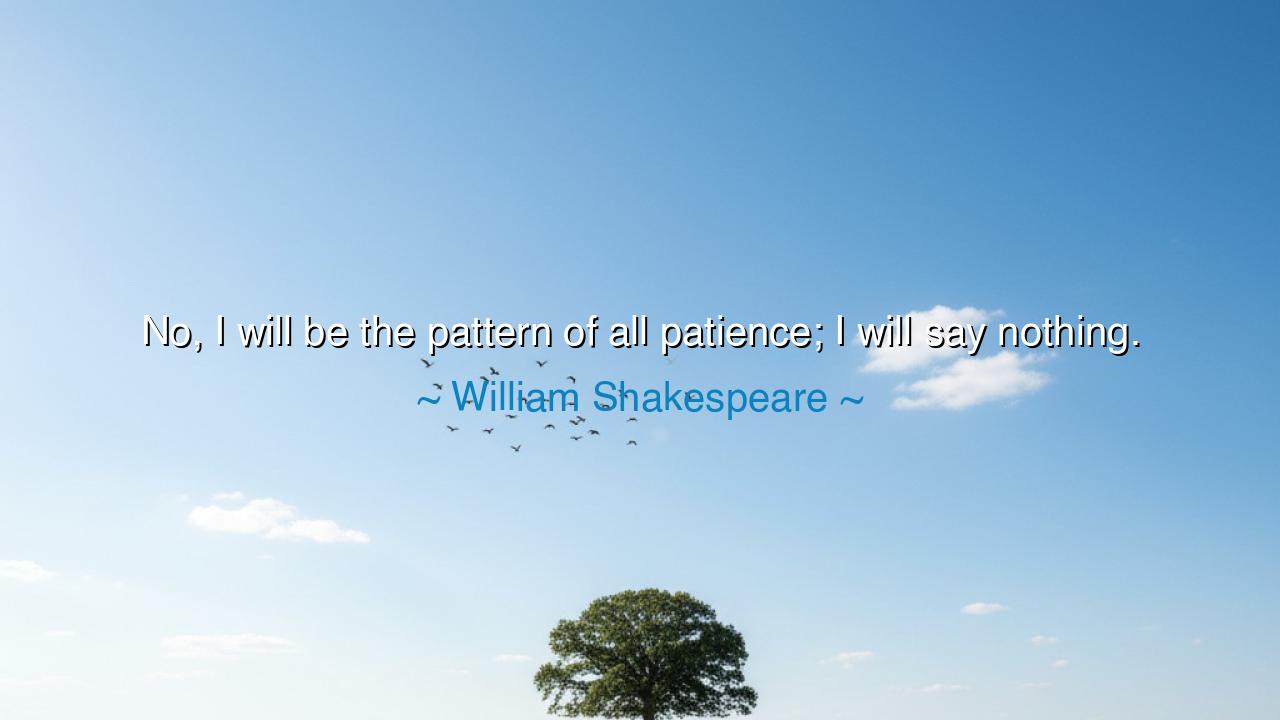
No, I will be the pattern of all patience; I will say nothing.






The words of William Shakespeare—“No, I will be the pattern of all patience; I will say nothing”—burn with the weight of self-restraint, a solemn vow uttered in the face of suffering. They remind us that true patience is not a hollow word, but a living discipline, a choice to endure without complaint, to let silence itself become a monument of strength. To be a pattern of patience is to set an example for others, to embody stillness when every impulse calls for outcry, to endure injustice without surrendering to bitterness.
The origin of this line is found in King Lear, one of Shakespeare’s most tragic works, where storms of grief and betrayal shake the soul. Lear, stripped of dignity and betrayed by those he loved, cries out in anguish. Yet in this moment, he proclaims his intention to endure, to let silence speak where words would only inflame. It is not the silence of despair, but of endurance—a defiance against fate itself. In that silence, Shakespeare reveals a truth that spans all ages: patience is the highest form of power, for it chooses restraint where rage would destroy.
History, too, provides us with this lesson. Consider Mahatma Gandhi, who became the very embodiment—the pattern—of patience in his struggle against oppression. When his people were beaten, mocked, and imprisoned, he answered not with swords but with silence, fasting, and peaceful resistance. Many mistook his quiet for weakness, but in truth it was greater strength than violence could ever muster. His silence was not emptiness, but a thunderclap of moral authority that shook empires. In him, Shakespeare’s vision becomes flesh: the one who is patient, who refuses to speak in anger, becomes a beacon for all humanity.
The power of such patience lies in its ability to break the cycle of vengeance. Words spoken in wrath can never be retrieved; they wound deeper than steel. But silence, chosen with wisdom, disarms the adversary. To say nothing is not to admit defeat—it is to deny the enemy the fuel of your anger. It is to stand firm as a rock, unmoved by the raging storm, teaching others that there is a nobility in bearing suffering without complaint. Patience, in this form, is not passive resignation but active mastery of the self.
And yet, Shakespeare’s line also stings with sorrow. For there are times when silence, though noble, is heavy, when the heart longs to cry out against injustice but restrains itself for the sake of endurance. It is a burden carried by saints, prophets, and leaders throughout history. They swallowed their cries, not because they lacked the words, but because their restraint was the greater sermon. Here lies the paradox: silence can both wound and heal, both oppress and uplift. The wisdom lies in knowing when to speak and when to be silent.
The lesson for us is this: if you would become strong in spirit, practice the art of restraint. When wronged, do not rush to defend yourself with angry words. When betrayed, do not let bitterness poison your tongue. Choose silence when speech would only destroy. This is the pattern of patience—to hold peace within when the world demands fury. But do not confuse patience with cowardice: when justice for others demands your voice, speak. When your own soul demands discipline, be silent.
In practice, cultivate this discipline daily. When anger rises, breathe and remain silent until calm returns. When tempted to answer insult with insult, remember that silence itself can be a shield. When suffering seems unbearable, endure with dignity, letting your patience inspire others. For to master patience is to master oneself, and the one who has mastered himself cannot be conquered by the world.
So let Shakespeare’s words echo like a vow upon our lips: “I will be the pattern of all patience; I will say nothing.” To endure silently is to show a strength rarer than valor in battle. It is to carve an example for others, to prove that patience is not weakness but the highest form of power. Let us then strive to be such a pattern, that others, seeing our restraint, may learn that silence, when chosen with wisdom, is the greatest victory of all.






AAdministratorAdministrator
Welcome, honored guests. Please leave a comment, we will respond soon